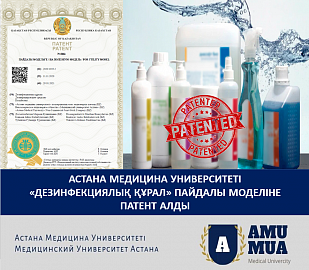After long-term and joint work of the employees of the Department of Research Activities of the NJSC “Astana Medical University” and its partner chemist-technologist Marzhan Dosmagambetova, the University received a patent for the useful model “Disinfectant” under number 5802 dated January 29, 2021, NIIP MJ RK.
This disinfectant “Despray” is intended for disinfection of the airspace of kindergartens, hospitals, clinics, schools and other premises from various bacteria, viruses, including COVID-19.
The uniqueness of this product is that there are no analogues of such a tool yet. Its advantage is that it is based on lactic acid, which is a natural product and can be considered as biologically safe.
This acid is characterized by high diffusion properties, moderate acidifying ability, strong antimicrobial action. It does not irritate skin and mucous membranes, resistant to storage and high temperatures. Lactic acid-based Despray has a broad spectrum of antimicrobial action, low toxicity, and ease of use for aerosol disinfection in the presence of people. In the external environment, lactic acid at pH2.0 ± 0.25 has a detrimental effect on microorganisms and is antimicrobial activity against various gram-negative and gram-positive microorganisms, tuberculosis pathogens, respiratory viruses, fungi of the genus Candida and Trichophyton, mold fungi. The introduction of polyhexamethylene guanidine hydrochloride into its composition enhances the antimicrobial properties of the tool. Due to bactericidal activity against ARVI, it mainly causes viruses belonging to six families: orthomyxoviruses (influenza viruses), para-myxoviruses (respiratory syncytial virus, metapneumoviruses, parainfluenza viruses 1-4), coronaviruses, picornaviruses (rhinoviruses), adenoviruses, parvoviruses (bocavirus), also mycobacterium tuberculosis, legionellosis, viruses of enteral and parenteral hepatitis, HIV, influenza, herpes and fungi, including molds, yeasts and fungi of the genus Candida.
In addition, polyhexamethylene guanidine hydrochloride gives the disinfectant prolonged antimicrobial properties.
I would like to note the relevance and timeliness of the creation of this tool during a pandemic associated with the spread of COVID-19.


